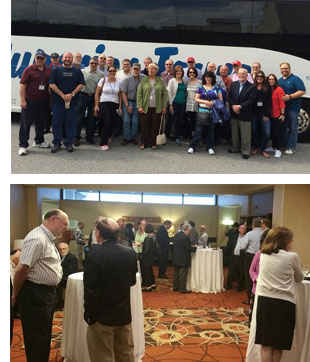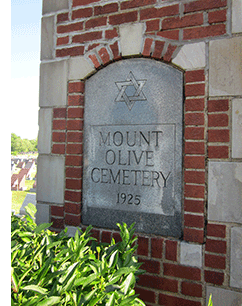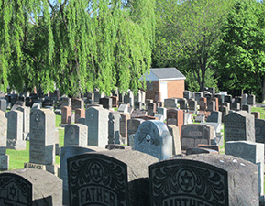 |
 The recent JCANA Conference in Baltimore was a huge success with participants from all over North America and speakers on a variety of subjects related to Jewish burial practices. The recent JCANA Conference in Baltimore was a huge success with participants from all over North America and speakers on a variety of subjects related to Jewish burial practices.
Of particular importance was Rabbi Menachem Goldberger’s discussion of the “Importance of History and the Continuity of Jewish Burial Customs.” Rabbi Goldberger addressed Jewish religious beliefs including the idea that death means moving from this world to the next when the body and soul, both divine creations, are separated, ultimately to be reunited in the “world to come.” He reviewed the process of the tahara (ritual cleansing of the body), the Jewish repudiation of cremation and talked about other customs relevant to death and burial. Rabbi Goldberger also emphasized the relationship of burial traditions to other rituals which ensure the preservation of the Jewish people.
Noteworthy, too, was the session by Donna Kane of the Jewish Community Services of Baltimore, who addressed the topic, “Aftercare: Helping the Bereaved Move Forward- Grief Doesn’t End Once Shiva is Over.” Although the majority of JCANA members deal with funerals and burials, and the bereavement process during that time, it is essential to understand how grieving affects people after shiva, and how to guide them in finding resources for continuing support. Ms. Kane reviewed behavior and conversation which can provide comfort to the mourner and suggested helping the bereaved cherish their memories and find solace in the notion that although death “ends life, it does not end a relationship.”
All conference speakers reinforced the JCANA community’s commitment to preserving the long legacy of traditional Jewish burial practices with all its ancient wisdom and intricacy.
Stan Kaplan, Chair |
|
 |
 Mount Olive Cemetery, southeast of Cleveland, Ohio, was founded in 1924 by the Forest City Hebrew Benevolent Association (formerly known as the Slobodker Benevolent Association) and the Taylor Road Synagogue, a traditional, Orthodox congregation. The Operations Board, which meets several times a year, is a 50/50 partnership with both parties represented by a maximum of 5 representatives from each group. The Perpetual Care Board, made up of representatives of section owners, financial advisers and representatives from the Jewish Federation of Cleveland, meets once annually to discuss and review the stability of our Perpetual Care endowment as well as the concerns of individual section owners and the larger community. Mount Olive Cemetery, southeast of Cleveland, Ohio, was founded in 1924 by the Forest City Hebrew Benevolent Association (formerly known as the Slobodker Benevolent Association) and the Taylor Road Synagogue, a traditional, Orthodox congregation. The Operations Board, which meets several times a year, is a 50/50 partnership with both parties represented by a maximum of 5 representatives from each group. The Perpetual Care Board, made up of representatives of section owners, financial advisers and representatives from the Jewish Federation of Cleveland, meets once annually to discuss and review the stability of our Perpetual Care endowment as well as the concerns of individual section owners and the larger community.
Mount Olive is operated according to traditional Orthodox burial practices. Burials of Jews of any denomination or affiliation are accommodated as long as they follow Jewish practices and are officiated by Jewish clergy. There is no above ground burial or accommodation for cremains.
This 54 acre property is not without its challenges. Originally, a large portion of the property was filled with gullies and a pond that had to be filled in to be usable for graves. This fill, which is rocky, as well as clay on other parts of the land, make it difficult to beautify the cemetery with trees and plants. The brisk, cold winds at the high elevation make winter burials arduous for even the heartiest of participants.
 Although the cemetery is not in the business of being a funeral home, it is sometimes necessary to have the graveside service inside because of the unpredictable, often frigid, Ohio weather. This is accommodated in a small meeting room which, for the convenience of the mourners, may have to be expanded to allow for larger on-site funerals. Although the cemetery is not in the business of being a funeral home, it is sometimes necessary to have the graveside service inside because of the unpredictable, often frigid, Ohio weather. This is accommodated in a small meeting room which, for the convenience of the mourners, may have to be expanded to allow for larger on-site funerals.
Mount Olive hosts the Jewish War veterans for a Memorial Day service and organizes community volunteers to help aging veterans place flags on Veterans Day. The cemetery also welcomes members of the Russian-Jewish community who, in a yearly commemorative service, come to visit the Russian sections and put flowers on the graves of those who served in the military of the former Soviet Union. Other acts of chesed include the burial of shaimos (holy scriptural writings) and pro bono burials for infants.
For almost 100 years, Mount Olive Cemetery has been, and continues to be, an integral and essential part of the Greater Cleveland Jewish community. |
|
 |
The recently concluded TV series, Dig (USA network) tantalizingly began with the birth of an animal described in the Bible, the red heifer. According to the Torah, a red heifer was slaughtered and burned so that the ashes could be used to purify those who had been rendered ritually impure through contact with a corpse. Only then, in a state of ritual purity, could someone ascend the Temple Mount. Anyone familiar with the biblical passages describing this ceremony could deduce from the show’s first episode that the story would involve the rebuilding of the Jewish Temple in Jerusalem. |
|
 |
In March, an act considered anti-Semitic occurred when a building in Oujad’s Jewish cemetery complex was set on fire. Although no one was injured, anti- Jewish slogans were reportedly found on nearby surfaces. The case is apparently still open.
There are two cemetery areas in Oujad. The Old Cemetery dates back 900 years with graves marked by stones resembling caskets. None of the tombstones have markings. The New Cemetery contains several hundred graves dating to the early 20th century. Stones are marked with paint or engraved in cement. There are several tzadikim (holy men) buried there whose graves are marked with fireplace dugouts and are occasionally visited by groups of Jews from Morocco and other countries, particularly France.
Although Zionism was outlawed in Morocco in 1959 and defined as a “serious crime,” Morocco ended that official position in the late 1980’s and since then has maintained good relations with Israel. Over the last 20 years, the king has ordered the reconstruction and renovation of many Jewish heritage sites. |
|
 |
The 7th Annual JCANA Conference, hosted by Andrew Katz of Beth El Memorial Park, was held in Baltimore, Maryland, May 3-6 at the DoubleTree Baltimore BWI Airport. Representatives from several hundred Jewish cemeteries throughout North America attended.
The theme of “Relational Judaism,” based on the ideas of educator Dr. Ron Wolfson, was the focus of the conference in terms of the importance of the continuity of Jewish burial traditions and reaching the unaffiliated within the Jewish community.
Following a welcome reception hosted by Hillside Memorial Park, the conference opened with a keynote presentation by Marvin Pinkert, Director of the Jewish Museum in Baltimore, which emphasized the importance of keeping family records for personal and historical purposes. The conference included a presentation by Rabbi Menachem Goldberger, of Baltimore’s Congregation Tiferes Yisroel, who discussed traditional Jewish burial customs and their role in honoring the deceased. An informative and engaging presentation by Dick Goldman, President of the Jewish Genealogy Society of Maryland, focused on the historical value of Jewish cemeteries and how the preservation of Jewish burial records is vital to understanding Jewish family lineage and Jewish history. Other sessions on a wide range of subjects related to the Jewish cemetery industry included outreach, marketing, human resources, regulations, counseling the bereaved and the continuity of Jewish burial customs.
 An interesting day of sight-seeing was offered and enjoyed. Sites included the historic Baltimore Hebrew Cemetery and Hebrew Friendship Cemetery, as well as the grave of Edgar Allen Poe at the Westminster Hall & Burying Ground. An architectural highlight was the Senator Theatre, a historic Art Deco movie theater featuring original details and a sidewalk in front of the theater featuring a “walk of fame” highlighting Baltimore cinematic accomplishments. An interesting day of sight-seeing was offered and enjoyed. Sites included the historic Baltimore Hebrew Cemetery and Hebrew Friendship Cemetery, as well as the grave of Edgar Allen Poe at the Westminster Hall & Burying Ground. An architectural highlight was the Senator Theatre, a historic Art Deco movie theater featuring original details and a sidewalk in front of the theater featuring a “walk of fame” highlighting Baltimore cinematic accomplishments.
Participants experienced the conference as a valuable opportunity to network with industry colleagues and exchange ideas. As an organization, JCANA continues to expand its efforts to support its member cemeteries – and the broader Jewish community – in their efforts to preserve Jewish cemeteries. |
|
 |
Do you know about the IAJGS International
Jewish Cemetery Project? |
| The International Jewish Cemetery Project, part of the International Association of Jewish Genealogical Societies, has as its mission to document every Jewish burial site in the world. According to their website, they have “successfully collected information about thousands of Jewish cemetery sites all over the world along with information on the location of the cemetery, and how to obtain more information.” The project is run entirely by volunteers committed to the preservation of Jewish history and memory.
To learn more about this important and fascinating program see their website: www.iajgsjewishcemeteryproject.org. |
|
For general information, please contact Stan Kaplan: stankaplan@jcana.org
For membership information, please contact Amy Koplow: akoplow@jcana.org
To send information or suggestions regarding the newsletter, you may e-mail newsletter@jcana.org
Please visit our website: www.jcana.org |
|







